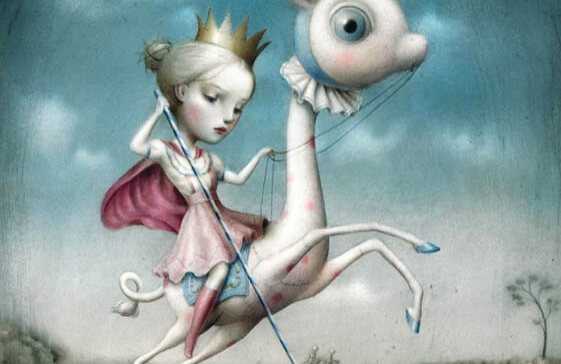7 Kinds of Emotional Vampires Sucking the Life Out of You


Written and verified by the psychologist Valeria Sabater
Emotional vampires don’t suck our blood, they suck our energy, our spirit. They follow us around, creating dysfunctional environments where we end up worn out, isolated and closed in by a kind of exhausting interaction that can seriously affect our physical and psychological health.
Although the term “emotional vampire” isn’t very scientific and you won’t find it in any diagnosis manual, “pop psychology” has created a definition of a very specific kind of person that not everyone knows about.
A lot has been written about them and we have an endless list of books available to us about them. However, we need to bring some attention to the little nuances.
“If someone is looking for a trashcan, don’t let it be your mind”
-Dalai Lama-
One of these nuances is about “energy”. It is said that emotional vampires “absorb our your energy”. If we pull back the veil, Edgar Allan Poe style, we’ll discover something that actually goes much deeper, and is much more worrying.
When we build relationships, we’re also carrying out a harmonious exchange of stimuli, reinforcements, information, emotions and sensations.
This magic of human interaction always generates changes in the brain. They come along with a reward, a positive chemical charge due to our neurotransmitters.
That said, when we’re with an emotional vampire, there is no exchange. The contract is one-way In other words, there is no flow in the communication, no give and take. This positive reciprocity that our brain recognizes as healthy and important does not exist.
What there is, in reality, is a heavy accumulation of negative emotions and stress, over-stimulating the brain. It can make one of two things happen. Either they make us feel invalidated, putting us into a corner of defenselessness, or they make us respond in a healthier way, by running away.

Emotional vampires and what they do to our health
We said earlier that the term “emotional vampire” was coined by pop psychology, though this dynamic and this kind of person is also seen in clinical practice and the everyday work of psychologists everywhere.
We cannot forget that the “energy” they suck — a combination of our spirit, motivation and self-esteem— is what enables us to do things.
Therefore any constant, negative interaction in our daily life implies a progressive, irremediable wearing down of our energy.
Also, the impact of emotional vampires is now much more worse because of new technologies. Cell phones are a common tool used by emotional vampires. They’re everywhere, thanks to facebook, twitter, and the like.
Emotional vampires are contagious
There are many “species” of emotional vampires. The colleague always talking about their misfortunes or whispering gossip. Even the toxic parent or relative controlling and disrespecting us.
We could give a thousand examples and still not have covered them all. Because we all have one of them in mind, an emotional vampire who, whether intentionally or not, snatches away our peace, drains our energy and puts us on their path of misery.
At the same time, their schemes work because of something quite interesting: our mirror neurons.
Mirror neurons are how this contagion spreads. They make us be sensitive and receptive to what emotional vampires send us: fear, hatred, unhappiness, bitterness, worry. And the heavier the negative load, the more they wear us out. The more our brain is over-stimulated, the greater the stress and the weakness.
These are the some of the symptoms that you’ll gradually notice:
- Exhaustion
- Heavy eyelids
- Tension headaches
- Low moods
- Sensation of wanting to run away
- Concentration problems
- Poor work performance.

Types of emotional vampires
Judith Orloff is a well-known North American psychiatrist and writer who has dedicated several books and studies to the subject of empathy, emotional contagion and the concept of emotional vampires.
Something that she makes very clear from the start is that not all people who match this profile are aware of it. They may be unaware that their behaviors and interactions are having a negative impact on those around them.
On the other hand, others not only know they’re doing it, but they do it with a purpose: to dominate others and build their own self-esteem.
Subjecting others to elevate themselves is a typical strategy of emotional vampires. Now let’s have a look at the 7 types.
He was like a cock who thought that the sun had risen to hear him crow
-George Eliot-
1. The narcissist
Their slogan is “me first”. Everything is about them. They long for admiration, recognition and to always be validated.
They lack empathy and they will always insist that everything be done according to their expectations, principles and opinion. They have a very limited ability to appreciate others or consider them, give authentic kindness, real friendship or true love.
How to protect yourself
- The key is to know how to communicate with them. Put limits on them, be sincere and properly handle their tedious ego and inconsiderate attitude.
- We should avoid putting our self-esteem in their hands. Therefore we need to see them with objectivity and awareness of their relational and emotional limitations.
2. The critic
Nothing you do, say, think or value will be enough for the critic. Nothing will be good enough for their refined taste, their wise ideas about life and infinite knowledge.
However, be careful, because their greatest skill is to speak with subtle affection and ironic paternalism to make you feel inferior.

How to protect yourself
- Put up your protective umbrella and deactivate the power that these criticisms have over you.
- Take power away from emotional vampires. If you make it clear that their opinions lack importance and that you know for yourself what’s good and bad, you’ll weaken them.
3. The tireless talker who never listens
The tireless talker is not interested in what you have to say to them, your thoughts or feelings. They only want you to be there to listen to them. To be the “container” where they can dump everything and vent and treat you like a garbage can.
If you have someone like this in your life, the physical and emotional exhaustion is obvious and very intense.
How to protect yourself
- These individuals do not know how to respond to non-verbal signals. So you have no choice but to interrupt them forcefully but politely, making it clear that you are not there to listen to all of their stuff, that you are not their diary or garbage can. You are a person to dialogue with, someone who also has needs and wants to be heard.
4. The victim
The constant victim is the one who the whole world has abandoned (from their perspective) and marginalized. Life is always handing them raw deals. They can be recognized instantly because their discourse is always negative, seeing themselves as a voodoo doll constantly being poked.
How to protect yourself
There is always low self-esteem behind these people, and we should have this clear from the start. Therefore, the best thing is to rationalize their tragedies as much as we can.
We should avoid being hard on them, instead being the lucid gaze that gradually helps them see that there is a solution to everything and that they need to take the reigns of their own life with responsibility.
5. The controller
These people will try to control every aspect of your life almost obsessively. They will manipulate your emotions to annihilate you, steal your energy, your positivity, your self-esteem and even your identity.
They invalidate us to the point of convincing us that everything we need can be summed up in one thiing: him or her.

How to protect yourself
- The secret to successfully defeating a controller is assertiveness and self-confidence. Never let them make you do things. Show gratitude for their advice and make it clear that you have your own advice.
6. The aggressive person
Emotional vampires that use anger and verbal or physical violence are the most violent ones. Sometimes a disagreement is all it takes for their rage, scorn or senseless anger to suddenly arise, leaving us shocked and breathless.
They are like a minefield where it’s almost impossible to avoid them exploding at any moment.
How to protect yourself
- There are two very useful strategies when faced with this kind of person. The only option is to recommend that they seek help to handle these reactions. If they don’t do it, the healthiest, and necessary, action to take is get away.
7. The sarcastic person
Some people see sarcasm as a sophisticated language tool to bring out the ironic side of life. As long as we see it like this, all is well.
However, when sarcasm is used to ridicule people, humiliate them and make themselves the genius with a crown of cruelty and a scepter of insolence, make no mistake: we’re talking about an emotional vampire.

How to protect yourself
- Sarcasm is a subtle weapon that we don’t see coming. But be careful, if you feel humiliated or like your self-esteem is affected, set limits. The sooner the better.
- We need to say loud and clear that we didn’t like what they said. If they laugh and say, “it’s just a joke”, we need to reiterate with assertiveness that this joke is not ok because it hurts.
- If the sarcastic person doesn’t see the effect of their actions and won’t change, it’s best to distance yourself.
What if I’m the emotional vampire?
At this stage this question is almost inevitable and even obligatory… Are we ourselves exhibiting behaviors of emotional vampires and wearing others out?
Despite what we may think, most us have shown some of these behaviors at some stage in our life. Whether because we had low self-esteem or because we were going through a difficult time.
“A selfish person is someone who insists on talking about themselves when you are dying to talk to them about you”
-Jean Cocteau-
So take a look, do you see any of these in yourself?
- Negative or catastrophic thoughts.
- The need to have everything under control, especially people around you.
- The need to let off steam with others, without considering their worries, opinions or comments.
- Being very critical of others.
- The constant sensation that everything is going wrong for you, that the world seems to be against you.
- Knowing that things aren’t going well but not wanting help. Getting annoyed if someone tries.
If that’s you, it’s important to take some time for reflection. First you need to strengthen your self-esteem, improve your ability to handle emotions and your communication skills.
However, it’s also a good idea to get professional help because, sometimes, behind this crust of negativity there is depression.
There are many types of emotional vampires. However, many of them can become more “human” again with the right help and sensitive, good guidance.
Emotional vampires don’t suck our blood, they suck our energy, our spirit. They follow us around, creating dysfunctional environments where we end up worn out, isolated and closed in by a kind of exhausting interaction that can seriously affect our physical and psychological health.
Although the term “emotional vampire” isn’t very scientific and you won’t find it in any diagnosis manual, “pop psychology” has created a definition of a very specific kind of person that not everyone knows about.
A lot has been written about them and we have an endless list of books available to us about them. However, we need to bring some attention to the little nuances.
“If someone is looking for a trashcan, don’t let it be your mind”
-Dalai Lama-
One of these nuances is about “energy”. It is said that emotional vampires “absorb our your energy”. If we pull back the veil, Edgar Allan Poe style, we’ll discover something that actually goes much deeper, and is much more worrying.
When we build relationships, we’re also carrying out a harmonious exchange of stimuli, reinforcements, information, emotions and sensations.
This magic of human interaction always generates changes in the brain. They come along with a reward, a positive chemical charge due to our neurotransmitters.
That said, when we’re with an emotional vampire, there is no exchange. The contract is one-way In other words, there is no flow in the communication, no give and take. This positive reciprocity that our brain recognizes as healthy and important does not exist.
What there is, in reality, is a heavy accumulation of negative emotions and stress, over-stimulating the brain. It can make one of two things happen. Either they make us feel invalidated, putting us into a corner of defenselessness, or they make us respond in a healthier way, by running away.

Emotional vampires and what they do to our health
We said earlier that the term “emotional vampire” was coined by pop psychology, though this dynamic and this kind of person is also seen in clinical practice and the everyday work of psychologists everywhere.
We cannot forget that the “energy” they suck — a combination of our spirit, motivation and self-esteem— is what enables us to do things.
Therefore any constant, negative interaction in our daily life implies a progressive, irremediable wearing down of our energy.
Also, the impact of emotional vampires is now much more worse because of new technologies. Cell phones are a common tool used by emotional vampires. They’re everywhere, thanks to facebook, twitter, and the like.
Emotional vampires are contagious
There are many “species” of emotional vampires. The colleague always talking about their misfortunes or whispering gossip. Even the toxic parent or relative controlling and disrespecting us.
We could give a thousand examples and still not have covered them all. Because we all have one of them in mind, an emotional vampire who, whether intentionally or not, snatches away our peace, drains our energy and puts us on their path of misery.
At the same time, their schemes work because of something quite interesting: our mirror neurons.
Mirror neurons are how this contagion spreads. They make us be sensitive and receptive to what emotional vampires send us: fear, hatred, unhappiness, bitterness, worry. And the heavier the negative load, the more they wear us out. The more our brain is over-stimulated, the greater the stress and the weakness.
These are the some of the symptoms that you’ll gradually notice:
- Exhaustion
- Heavy eyelids
- Tension headaches
- Low moods
- Sensation of wanting to run away
- Concentration problems
- Poor work performance.

Types of emotional vampires
Judith Orloff is a well-known North American psychiatrist and writer who has dedicated several books and studies to the subject of empathy, emotional contagion and the concept of emotional vampires.
Something that she makes very clear from the start is that not all people who match this profile are aware of it. They may be unaware that their behaviors and interactions are having a negative impact on those around them.
On the other hand, others not only know they’re doing it, but they do it with a purpose: to dominate others and build their own self-esteem.
Subjecting others to elevate themselves is a typical strategy of emotional vampires. Now let’s have a look at the 7 types.
He was like a cock who thought that the sun had risen to hear him crow
-George Eliot-
1. The narcissist
Their slogan is “me first”. Everything is about them. They long for admiration, recognition and to always be validated.
They lack empathy and they will always insist that everything be done according to their expectations, principles and opinion. They have a very limited ability to appreciate others or consider them, give authentic kindness, real friendship or true love.
How to protect yourself
- The key is to know how to communicate with them. Put limits on them, be sincere and properly handle their tedious ego and inconsiderate attitude.
- We should avoid putting our self-esteem in their hands. Therefore we need to see them with objectivity and awareness of their relational and emotional limitations.
2. The critic
Nothing you do, say, think or value will be enough for the critic. Nothing will be good enough for their refined taste, their wise ideas about life and infinite knowledge.
However, be careful, because their greatest skill is to speak with subtle affection and ironic paternalism to make you feel inferior.

How to protect yourself
- Put up your protective umbrella and deactivate the power that these criticisms have over you.
- Take power away from emotional vampires. If you make it clear that their opinions lack importance and that you know for yourself what’s good and bad, you’ll weaken them.
3. The tireless talker who never listens
The tireless talker is not interested in what you have to say to them, your thoughts or feelings. They only want you to be there to listen to them. To be the “container” where they can dump everything and vent and treat you like a garbage can.
If you have someone like this in your life, the physical and emotional exhaustion is obvious and very intense.
How to protect yourself
- These individuals do not know how to respond to non-verbal signals. So you have no choice but to interrupt them forcefully but politely, making it clear that you are not there to listen to all of their stuff, that you are not their diary or garbage can. You are a person to dialogue with, someone who also has needs and wants to be heard.
4. The victim
The constant victim is the one who the whole world has abandoned (from their perspective) and marginalized. Life is always handing them raw deals. They can be recognized instantly because their discourse is always negative, seeing themselves as a voodoo doll constantly being poked.
How to protect yourself
There is always low self-esteem behind these people, and we should have this clear from the start. Therefore, the best thing is to rationalize their tragedies as much as we can.
We should avoid being hard on them, instead being the lucid gaze that gradually helps them see that there is a solution to everything and that they need to take the reigns of their own life with responsibility.
5. The controller
These people will try to control every aspect of your life almost obsessively. They will manipulate your emotions to annihilate you, steal your energy, your positivity, your self-esteem and even your identity.
They invalidate us to the point of convincing us that everything we need can be summed up in one thiing: him or her.

How to protect yourself
- The secret to successfully defeating a controller is assertiveness and self-confidence. Never let them make you do things. Show gratitude for their advice and make it clear that you have your own advice.
6. The aggressive person
Emotional vampires that use anger and verbal or physical violence are the most violent ones. Sometimes a disagreement is all it takes for their rage, scorn or senseless anger to suddenly arise, leaving us shocked and breathless.
They are like a minefield where it’s almost impossible to avoid them exploding at any moment.
How to protect yourself
- There are two very useful strategies when faced with this kind of person. The only option is to recommend that they seek help to handle these reactions. If they don’t do it, the healthiest, and necessary, action to take is get away.
7. The sarcastic person
Some people see sarcasm as a sophisticated language tool to bring out the ironic side of life. As long as we see it like this, all is well.
However, when sarcasm is used to ridicule people, humiliate them and make themselves the genius with a crown of cruelty and a scepter of insolence, make no mistake: we’re talking about an emotional vampire.

How to protect yourself
- Sarcasm is a subtle weapon that we don’t see coming. But be careful, if you feel humiliated or like your self-esteem is affected, set limits. The sooner the better.
- We need to say loud and clear that we didn’t like what they said. If they laugh and say, “it’s just a joke”, we need to reiterate with assertiveness that this joke is not ok because it hurts.
- If the sarcastic person doesn’t see the effect of their actions and won’t change, it’s best to distance yourself.
What if I’m the emotional vampire?
At this stage this question is almost inevitable and even obligatory… Are we ourselves exhibiting behaviors of emotional vampires and wearing others out?
Despite what we may think, most us have shown some of these behaviors at some stage in our life. Whether because we had low self-esteem or because we were going through a difficult time.
“A selfish person is someone who insists on talking about themselves when you are dying to talk to them about you”
-Jean Cocteau-
So take a look, do you see any of these in yourself?
- Negative or catastrophic thoughts.
- The need to have everything under control, especially people around you.
- The need to let off steam with others, without considering their worries, opinions or comments.
- Being very critical of others.
- The constant sensation that everything is going wrong for you, that the world seems to be against you.
- Knowing that things aren’t going well but not wanting help. Getting annoyed if someone tries.
If that’s you, it’s important to take some time for reflection. First you need to strengthen your self-esteem, improve your ability to handle emotions and your communication skills.
However, it’s also a good idea to get professional help because, sometimes, behind this crust of negativity there is depression.
There are many types of emotional vampires. However, many of them can become more “human” again with the right help and sensitive, good guidance.
This text is provided for informational purposes only and does not replace consultation with a professional. If in doubt, consult your specialist.







